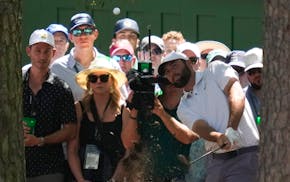MANCHESTER, ENGLAND - They played as if winning would not be enough, as if they would not be satisfied unless they could entertain as well, as if the longer they played, the more viewers would find them in time to watch their exhausted celebration.
And so the U.S. women's soccer team, in the Olympic semifinals, fell behind three times, gave up a hat trick, took a physical beating, seized on a rare call to force overtime and finally beat Canada 4-3 with 30 seconds left in extra time, when their rising star rose just high enough.
Forward Alex Morgan, bullied all night by Canada's physical defense, leaped to nudge in a header on a cross from sub Heather O'Reilly in the 123rd minute to send the U.S. to the gold medal game against Japan, the team that beat the Americans for the last World Cup.
After the game mercifully ended, after Abby Wambach had grabbed Morgan's face and told her she loved her, the U.S. players sat in the locker room asking why they have to make everything so difficult.
"I can't ever remember feeling this way after scoring a goal," Morgan said. "It's so exhilarating. I wanted to cry on the field."
Morgan ran to the stands to hug her family.
"They were shaking," she said, and long after the match, after she had dressed and submitted to a drug test, Morgan was still shaking, too. "It was the best feeling, ever," she said.
She and her teammates ran the gamut on a cold night at historic Old Trafford, home of Manchester United. The U.S. hadn't given up a goal in more than 360 minutes, but on Monday, three times Canada forward Christine Sinclair scored, the latter two on headers. And three times the U.S. answered.
"Usually, we come back once," midfielder Megan Rapinoe said. "That's our trademark. Tonight, we had to do it three times."
Rapinoe's first goal was a corner kick that skidded through the legs of a Canada defender and into the net. "My second goal," Rapinoe said, "was the goal of my life."
That shot, taken from the top righthand corner of the box, clanged off the far post and bounced horizontally, just in.
The Americans' third goal caused Sinclair to say, "It's a shame in a game like that, which is so important, that the ref decided the result before the game started. We feel cheated."
Referee Christina Pedersen awarded the U.S. an indirect free kick near the top of the box, citing Canada goalie Erin McLeod for holding the ball too long. That kick led to a hand ball call that set up Wambach's successful penalty kick that sent the match to overtime.
The Canadians felt robbed. The Americans admitted it was a rare call, but said McLeod had delayed far too often and had been warned. Asked whether she felt sympathy for the Canadians, U.S. coach Pia Sundhage said, "No."
'The best player in the world'
In extra time, Wambach struck a header, off a pass from Morgan, that hit the crossbar, and finally, with U.S. goalie Hope Solo beginning to prepare herself for penalty kicks, Wambach sent a pass wide for O'Reilly, who "clipped" a cross to the front of the goal.
"Usually, when you send one in there, you figure Abby is going to make something happen," O'Reilly said.
Instead it was Morgan, who Wambach says "is going to be the best player in the world."
Canada played as if it knew it couldn't match the Americans for talent. In the previous 26 games between the teams, the U.S. had won 22 and tied the others. The Canadians played physically, twice sandwiching Wambach on corner kicks.
"It was like rugby out there," Solo said. "It was a bloodbath."
In the end it was the kind of game that draws people to their TV sets, or keeps them rooted to their couch.
"We were asking why we have to make things so difficult," said midfielder Carli Lloyd. "I think we're just trying to gain more fans."
Jim Souhan can be heard Sundays from 10 a.m. to noon and weekdays at 2 p.m. on 1500-AM. His Twitter name is SouhanStrib. • jsouhan@startribune.com

Souhan: Why Tiger Woods should keep swinging
Souhan: Scheffler wins Masters again, shows what makes him special
Morikawa falters in final round at Masters

Keeping up with the Joneses who helped design Augusta National's classic back nine


